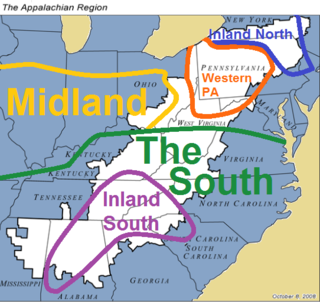| Look up Southron or southron in Wiktionary, the free dictionary. |
Southron is a term meaning "a person from the south". It was originally used by Scots to refer to the English, or by the people of Northern England to refer to the people of Southern England. Other notable uses are:

England is a country that is part of the United Kingdom. It shares land borders with Wales to the west and Scotland to the north. The Irish Sea lies west of England and the Celtic Sea to the southwest. England is separated from continental Europe by the North Sea to the east and the English Channel to the south. The country covers five-eighths of the island of Great Britain, which lies in the North Atlantic, and includes over 100 smaller islands, such as the Isles of Scilly and the Isle of Wight.

Northern England, also known as the North of England or simply the North, is the northern part of England, considered as a single cultural area. It extends from the Scottish border in the north to near the River Trent in the south, although precise definitions of its southern extent vary. Northern England approximately comprises three statistical regions: the North East, North West and Yorkshire and the Humber. These have a combined population of around 14.9 million as of the 2011 Census and an area of 37,331 km2. Northern England contains much of England's national parkland but also has large areas of urbanisation, including the conurbations of Greater Manchester, Merseyside, Teesside, Tyneside, Wearside, and South and West Yorkshire.

Southern England, or the South of England, also known as the South, refers roughly to the southern counties of England. The extent of this area can take a number of different interpretations depending on the context, including geographical, cultural, political and economic.
- A person from the Southern United States in general
- Historically, a person from the Confederate States of America
- A member of the Haradrim, a human people in the fiction of J. R. R. Tolkien
- "At Lord's", a poem about cricket by Francis Thompson

The southern United States, also known as the American South, Dixie, or simply the South, is a region of the United States of America. It is located between the Atlantic Ocean and the western United States, with the midwestern United States and northeastern United States to its north and the Gulf of Mexico and Mexico to its south.

The Confederate States of America — commonly referred to as the Confederacy — was a white supremacist unrecognized republic in North America that existed from 1861 to 1865. The Confederacy was originally formed by seven secessionist slave-holding states—South Carolina, Mississippi, Florida, Alabama, Georgia, Louisiana, and Texas—in the Lower South region of the United States, whose economy was heavily dependent upon agriculture, particularly cotton, and a plantation system that relied upon the labor of African-American slaves. Convinced that white supremacy and the institution of slavery were threatened by the November 1860 election of Republican candidate Abraham Lincoln to the U.S. presidency on a platform which opposed the expansion of slavery into the western territories, the Confederacy declared its secession in rebellion to the United States, with the loyal states becoming known as the Union during the ensuing American Civil War. Confederate Vice President Alexander H. Stephens described its ideology as being centrally based "upon the great truth that the negro is not equal to the white man; that slavery, subordination to the superior race, is his natural and normal condition".
| This disambiguation page lists articles associated with the title Southron. If an internal link led you here, you may wish to change the link to point directly to the intended article. |



